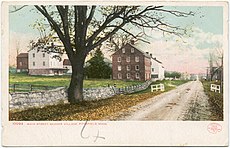
In the United States, the meaning of village varies by geographic area and legal jurisdiction. In formal usage, a "village" is a type of administrative division at the local government level. Since the Tenth Amendment to the United States Constitution prohibits the federal government from legislating on local government, the states are free to have political subdivisions called "villages" or not to and to define the word in many ways. Typically, a village is a type of municipality, although it can also be a special district or an unincorporated area. It may or may not be recognized for governmental purposes.
In informal usage, a U.S. village may be simply a relatively small clustered human settlement without formal legal existence. In colonial New England, a village typically formed around the meetinghouses that were located in the center of each town.[1] Many of these colonial settlements still exist as town centers. With the advent of the Industrial Revolution, industrial villages also sprang up around water-powered mills, mines, and factories.[1] Because most New England villages were contained within the boundaries of legally established towns, many such villages were never separately incorporated as municipalities.
A relatively small unincorporated community, similar to a hamlet in New York state, or even a relatively small community within an incorporated city or town, may be termed a village. This informal usage may be found even in states that have villages as incorporated municipalities and is similar to the usage of the term "unincorporated town" in states having town governments.
States that formally recognize villages vary widely in the definition of the term.[2] Most commonly, a village is either a special district or a municipality. As a municipality, a village may
- differ from a city or town in terms of population;
- differ from a city in terms of dependence on a township; or
- be virtually equivalent to a city or town.
- ^ a b Joseph S. Wood (2002), The New England Village, Johns Hopkins University Press
- ^ 2012 Census of Governments, Individual State Descriptions (PDF)